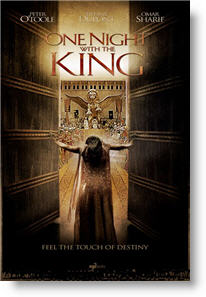
"One Night With The King" -- Movie Review
A little while ago I wrote in my online Daily Devotions, while we were looking at the book of Esther, that this book would make a great movie. I had no idea that such a movie had been made and was soon to be released, something which one of the users of the devotions immediately told me.
Now in the theatres we went to see it a few days ago. I wish I could rave about the film and tell you that it is a must-see, but I cannot. There are bits and pieces of it that I appreciated, but in many respects it felt like a poor remake of an aging religious blockbuster like "The Ten Commandments" or "Ben-Hur."
Set in Susa, the capital of the Persian Empire, which is a place on the western edge of modern-day Iran, the city that the moviemakers conjured up using contemporary computer magic, was dominated by a palace that looked more like a merger between New York's Plaza Hotel and Niagara Falls! How much more meaningful it would have been if they could have put together something that was more period appropriate. The setting was more a tribute to the film-makers determination to exaggerate than to represent the beautiful story that tells itself so well in the Old Testament in the right scale.
The set from the very start had me on my guard: if they would take liberties with the environment of the story, then what was to prevent them taking liberties with the story itself?
In some ways they followed the basic drift of the book of Esther, but in other ways they embroidered in a manner that left me feeling antsy. For example, Esther is given a necklace that sparkles in a particular way to show us that she is of true Jewish heritage. Then one of her young male chums is hauled away and made a eunuch in the palace so that later he becomes a convenient go-between. Little touches like this might seem cute to a Hollywooder, but don't do a lot for someone who believes this is an extraordinary story that does not need such props in order to make its impact.
I imagine Esther to have been an extraordinary woman -- intelligent, charming, characterful. What we got instead was a delightful Esther, but one who would have been better cast as a member of the Susa High School cheerleading squad. Joyfully played by Tiffany Dupont, we got a more of a frothy (and sometimes thoughtful) middle American woman than the person of courage, depth, and integrity, who was prepared to put her all on the line in order to save her people from the wrath that Haman the Agagite was stirring up against them. I want to give Ms Dupont the benefit of the doubt and say that she didn't have much of a script to work with.
The story of Esther in the Bible is exquisite, one of the greatest tales of human literature as well as Holy Writ, but although it was not Disney that was behind this movie, there was a Disnification that softened the edges and missed the subtleties. (It is, in fact, distributed by 20th Century Fox). Perhaps it is dangerous when someone who has tried for much of his life to be a faithful Bible student to go to a representation of Scripture in a medium that works best when it trivializes.
Having said these unkind things about the movie, however, let me say some nice things, too. Although there is a lot of embroidery and some dumbing-down, "One Night with the King" does not stray too far from the original storyline. We get a watered down touch of the flavor of what Esther is about even if in the process we are robbed of the deeper dimensions.
For my money the star of the film was John Rhys-Davies, the Welsh actor who played Gimli in "The Lord of the Rings" and in this movie plays Mordecai, Esther's uncle and Haman's nemesis. Rhys-Davies captures the character who is there on the pages of Scripture perfectly. While I have already forgotten the Ahasuerus, the Esther, and the Haman, from the movie, as I scanned the Book of Esther this afternoon I was seeing in my mind's eye the face of Rhys-Davies's Mordecai, hearing his voice, and catching the twinkle in his eye.
I hope that now Esther has been presented in this rather inadequate way on the big screen someone else will pick the book up and do a far better job with it. It is a piece of biblical writing for times like these, when faithful people find their backs increasingly against the wall both in the wider culture and often, as for those of us who are Episcopalians, in the churches. It is a paeon of praise to the courage of ordinary people who are put in extraordinary positions at times when more than their own safety hangs in the balance.
Read the book... But if you do go and see the film, take a pinch or two of salt with you.





1 comment:
Thanks for the review. I stumbled across this movie in the listings for our local cineplex last week -- I had not heard of it beforehand -- and had considered checking it out. However, I think I will wait a few months and add it to my Netflix queue instead.
Post a Comment